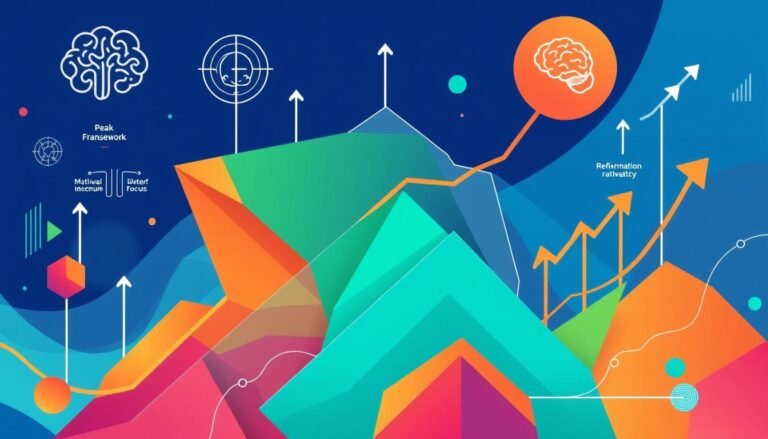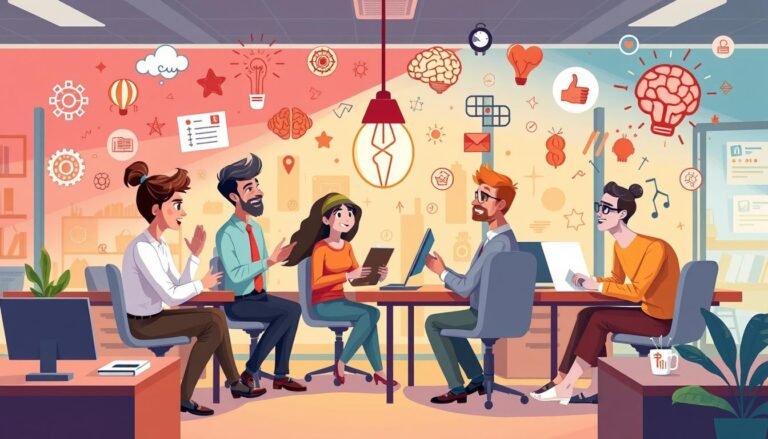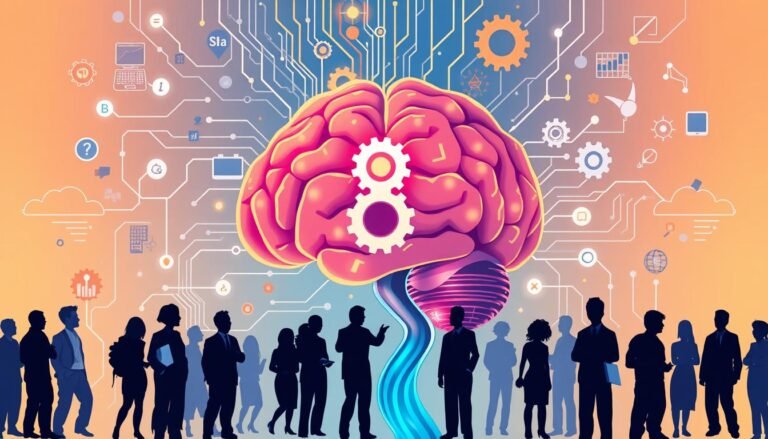Psychological Implications of AI in Workplace
The rise of artificial intelligence (AI) in the workplace is changing how we work. As AI becomes more common, employees face new challenges. Many worry about job security and keeping up with technology. This shift is causing AI anxiety and fears of job displacement.
A recent study shows that 51% of workers fear losing their jobs to AI. This worry affects more than just job security. It impacts mental health and how people feel at work. As companies adopt AI, some employees feel stressed and unsure about their future.
Human-machine collaboration is now a reality in many fields. While this brings new opportunities, it also creates new pressures. Workers must learn to work alongside AI systems. This change can be exciting, but it’s also a source of stress for many.
Companies need to address these concerns. If they don’t, they might see more turnover and less productivity. It’s crucial to help employees feel secure and valued as AI becomes more common in the workplace.
Key Takeaways
- AI is changing workplaces rapidly, causing stress for many employees
- 51% of workers worry about losing their jobs to AI
- Job displacement fears affect mental health and work performance
- Human-machine collaboration is becoming more common
- Companies must address AI anxiety to maintain a healthy workforce
- Supporting employees during AI adoption is crucial for success
Understanding AI’s Impact on Workplace Psychology
AI is changing the way we work. It’s altering job roles and how employees see their jobs. Let’s look at how AI is changing workplaces and its effects on workers.
Defining the AI Revolution in Modern Workplaces
The AI revolution is changing work processes in many industries. Companies are using AI in customer service and data analysis. This change brings new opportunities but also worries about job security.
Current Statistics and Trends
The World Economic Forum says AI will replace 85 million jobs by 2025. This shows AI’s big impact on jobs. Yet, 75% of employees are worried about AI making jobs disappear.
Despite these fears, over half of employees don’t know how their company uses AI. But, 78% of companies already use AI.
Employee Perception Studies
People have different views on AI at work. A study by the American Psychological Association found that many worry about AI and feel stressed or burnt out. This shows a link between AI anxiety and job happiness.
But, 77% of workers feel better about AI if they help decide how it’s used. It’s important to understand these feelings to make AI work better in the workplace.
Psychological Implications of AI in Workplace
The rise of AI in the workplace has big psychological effects. A study found that 39% of workers fear AI might make their jobs obsolete. This fear is real, as 78% of top leaders say their companies use AI.
AI’s impact on workers’ minds is deep. Those worried about AI are 51% more likely to say it hurts their mental health. This worry shows up in many ways:
- 64% of AI-concerned employees feel tense or stressed during workdays
- 41% believe they don’t matter to their employer
- Almost half intend to seek new jobs within a year
AI and cognitive biases meet in workplace views. Education affects AI anxiety, with 44% of high school grads worried about job loss. Racial gaps also show, with 50% of Black workers worried about AI replacing their jobs, versus 34% of white workers.
Emotional intelligence and AI are key in this setting. Companies can lessen negative effects by:
- Being open about AI use (75% of employees would feel better with clear communication)
- Offering AI training and advice
- Starting AI mental health resources and education
By tackling these psychological issues, companies can build a stronger, more flexible team in the AI age.
| AI Concern | Percentage | Impact |
|---|---|---|
| Job Obsolescence | 39% | Increased stress, job-seeking behavior |
| Lack of AI Knowledge | 54% | Uncertainty, potential misunderstandings |
| Workplace Monitoring | 51% | Discomfort, feeling micromanaged |
The Evolution of Workplace Anxiety in the AI Era
The rise of artificial intelligence has brought a new wave of fear to workers. This fear is not new, but its effect on white-collar jobs is different from before.
Historical Context of Automation Fears
Since the Industrial Revolution, workers have worried about losing their jobs to machines. Now, AI makes these fears even more real. But this time, it’s not just manual jobs at risk. Even jobs that require thinking are now in danger.
Unique Characteristics of AI-Related Stress
AI-related stress is different from past fears. It affects office workers who used to feel safe. AI can do tasks that used to be only for humans. This creates uncertainty and can make workers feel overwhelmed.
Impact on White-Collar Workers
The impact of AI on white-collar jobs is big. Jobs in finance, writing, and design are changing fast. Workers are worried about becoming outdated and need to keep learning new skills. This change is hard for their mental health.
| AI Impact | Effect on Workers |
|---|---|
| Cognitive Task Replication | Increased Job Insecurity |
| Constant Tech Adaptation | Higher Stress Levels |
| AI Error Potential | Fluctuating Trust in Technology |
But AI is not all bad. In manufacturing, it can make workers feel less stressed. For low-skilled jobs, it can even improve mental health. As AI keeps getting better, it’s important to understand and manage its effects on our mental health at work.
Employee Mental Health Challenges and AI Integration
The rise of AI in workplaces brings new challenges to employee mental health. As AI becomes more common, stress in the workplace is increasing. A recent survey by the American Psychological Association found that 38% of U.S. workers fear AI might make their job duties obsolete in the future.
This concern about AI and mental health is real. A Goldman Sachs report says 45% of tasks in legal and administration professions could soon be automated. This threat of job loss is a big contributor to workplace stress.
- 51% of workers affected by AI anxiety report negative impacts on their mental health
- 64% typically feel tense or stressed during the workday
- 46% of those worried about AI replacing their job duties plan to seek new employment
To tackle these mental health issues, companies must act. They should provide training and technical support for new AI tools. It’s also key to communicate clearly about AI plans to reduce anxiety. Offering mental health support programs and stress management workshops can help employees adjust to these changes.
| AI Impact | Employee Concern | Company Response |
|---|---|---|
| Job automation | Fear of obsolescence | Skill development programs |
| Increased efficiency | Intensified workload | Workload management strategies |
| Data collection | Privacy concerns | Transparent data policies |
By facing these challenges head-on, companies can create a supportive environment. This balance between technological advancement and employee well-being is crucial.
Cognitive and Emotional Responses to AI Implementation
AI in workplaces brings up complex feelings and thoughts in employees. Studies show that knowing about AI can lead to more depression and feeling exhausted. This shows the big mental hurdles workers face when adapting to AI.
Fear of Obsolescence
Many workers fear losing their jobs as AI gets better. Experts say AI might replace 47% of jobs in the US and 55% of jobs in China’s manufacturing. This fear can really hurt how happy and productive workers are.
Adaptation Stress
The fast introduction of AI causes a lot of stress for workers. A study with 321 people found that knowing about AI can make them feel more emotionally drained. Workers feel they must learn new skills fast to stay important in an AI world.
Professional Identity Crisis
With AI doing more, many workers doubt their role and worth. A study of 80 IT pros showed worries about AI affecting their privacy and changing work rules. This change can make workers less happy and more likely to leave.
| Impact | Percentage |
|---|---|
| US jobs potentially replaced by AI | 47% |
| Chinese manufacturing jobs easily replaceable | 55% |
| Workers replaced by AI at Foxconn Kunshan Factory | 60,000 |
Companies have a big role in easing these mental effects. Feeling supported by their organization can help reduce feelings of exhaustion and depression. By offering help and resources, companies can help workers deal with AI changes while keeping their well-being and job identity.
Building Resilience in an AI-Enhanced Workplace
AI is changing how we work. It’s important for both employees and employers to adapt. Let’s look at ways to build resilience and succeed in this new world.
Developing Adaptive Mindsets
Being open to change is essential. A study found 73% of employees see AI’s impact on their jobs. Seeing AI as a growth tool, not a threat, encourages innovation.
Stress Management Strategies
AI can make people anxious. It’s important to manage stress well. Mindfulness and cognitive strategies help employees deal with AI stress. Companies should support mental health during this change.
Professional Development Opportunities
Learning AI skills is key for career growth. Yet, only 39% of employees get AI training. This shows a need for more AI education.
| Executive Perspective | Employee Reality |
|---|---|
| 64% invest in AI for productivity | 36% feel positive about AI |
| 55% believe AI critical for workforce | 63% have negative/mixed feelings |
| 46% have clear AI strategy | 39% receive AI training |
To build resilience in the AI era, a balanced approach is needed. Companies should invest in AI skills and address employee concerns. By promoting adaptability, stress management, and targeted training, organizations can build a resilient workforce.
Leadership’s Role in Managing AI Transition
Leaders are key in guiding their teams through AI changes. They need a mix of strategic planning and caring for their team. A study of 391 South Korean workers shows how crucial this is.
The study found that AI can make workers feel insecure. This insecurity can harm their commitment to work. Leaders must create strong AI rules to tackle these issues.
Leaders who act with ethics can make a big difference. They can lessen worker worries and keep the workplace positive during AI changes.
| Leadership Aspect | Impact on AI Transition |
|---|---|
| Ethical Leadership | Reduces AI-induced job insecurity |
| Coaching Leadership | Alleviates stress from AI adoption |
| Transparent Communication | Builds trust and reduces uncertainty |
Coaching leadership is also vital. It helps workers deal with the stress of new AI. Leaders can guide them through the changes smoothly.
“Effective leadership in AI transition is not just about implementing new technologies, but also about managing the human side of change.”
To manage AI changes well, leaders should talk openly, involve their team, and offer learning chances. These steps help create a supportive work place and build team strength.
Creating a Supportive Work Environment
A supportive work environment is crucial for AI success. Companies that support AI in the workplace see big benefits. Let’s look at ways to make a positive atmosphere during AI changes.
Transparent Communication Strategies
Open talks about AI build trust and calm fears. Keeping employees updated on AI projects makes them feel important. This clear communication reduces worries and boosts security.
Employee Involvement Programs
Getting staff involved in AI decisions boosts confidence and lowers stress. Programs that let employees share AI ideas make them feel included. This leads to better results and smoother changes.
Mental Health Support Systems
Mental health is key during AI changes. Offering counseling and stress management workshops helps employees adjust. Companies that focus on this see better well-being and work performance.
| Support Strategy | Impact |
|---|---|
| Transparent Communication | 15% increase in productivity |
| Employee Involvement | 23% higher profitability |
| Mental Health Support | Reduced burnout rates |
By using these strategies, companies create a supportive space for AI changes. This approach leads to smoother integration and better results for everyone.
Measuring and Monitoring Psychological Well-being
AI is changing how we work, making it key to track how it affects our minds. Regular checks help see how AI impacts workers. Companies can use these metrics to see if employees are happy, stressed, or burnt out.
- 38% of workers worry about AI making their jobs obsolete
- 51% of those concerned report negative mental health impacts
- 64% of worried employees feel tense or stressed at work
These numbers show we need strong ways to watch over our mental health at work. Employers can look at how often people leave, miss work, and perform to understand AI’s effects. They can also use feedback to make AI work better for everyone.
Good tools for measuring well-being include:
- Regular surveys to check job happiness
- Stress level check-ins
- Performance metrics analysis
- Anonymous feedback channels
By always checking these metrics, companies can spot problems early. They can then help their workers better. This way, as AI keeps changing work, everyone can stay supported and happy.
Conclusion
The future of work with AI is changing fast, reshaping our workplaces. AI’s growth rate is expected to soar by 54%. Already, about 80% of employers use AI in some way, showing it’s widely adopted.
AI offers great opportunities but also raises concerns. Nearly half of today’s jobs could be at risk from AI. Yet, AI is expected to create more jobs than it replaces, showing we need to adapt and upskill.
The secret to success in this new world is AI-human collaboration. As 40% of HR functions are now aided by AI, we’re moving towards a better partnership between humans and machines. By embracing this partnership and tackling AI’s ethical issues, we can create a workplace that uses technology wisely and values human well-being and innovation.
In conclusion, AI’s impact on the workplace is deep and wide. By understanding these effects and taking action, we can make AI a force for good. This will lead to a more productive and fulfilling work environment.
Source Links
- The work affective well-being under the impact of AI – Scientific Reports
- The mental health implications of artificial intelligence adoption: the crucial role of self-efficacy – Humanities and Social Sciences Communications
- How AI Affects Mental Health in the Workplace
- The Emotional Impacts of AI in the Workplace – WorkProud
- Worried about AI in the workplace? You’re not alone
- Confronting Anxiety About AI: Workplace Strategies For Employee Mental Health
- Worries about artificial intelligence, surveillance at work may be connected to poor mental health
- The psychological impact of AI: challenges to healthy adoption – Raona
- The Impact of Artificial Intelligence on the Mental Health of Manufacturing Workers: The Mediating Role of Overtime Work and the Work Environment
- AI in Business: How Artificial Intelligence Affects Employee Psychology
- AI can trigger psychological side effects
- Navigating AI’s impact on employee wellbeing
- The Association between Artificial Intelligence Awareness and Employee Depression: The Mediating Role of Emotional Exhaustion and the Moderating Role of Perceived Organizational Support
- AI is changing every aspect of psychology. Here’s what to watch for
- The Rise of AI and Its Impact on Your Workforce.
- AI in Action: Building Resilience and Readiness at Work
- Navigating AI transitions: how coaching leadership buffers against job stress and protects employee physical health
- Code green: ethical leadership’s role in reconciling AI-induced job insecurity with pro-environmental behavior in the digital workplace – Humanities and Social Sciences Communications
- The Future Of Work: AI, Engagement, And Mental Health
- Embracing AI in the Workplace: Navigating Opportunities & Challenges
- 2023 Work in America survey: Artificial intelligence, monitoring technology, and psychological well-being
- The Role of Artificial Intelligence in Improving Workplace Well-Being: A Systematic Review
- Balancing the Pros and Cons of AI in the Workplace
- Artificial intelligence in the workplace








